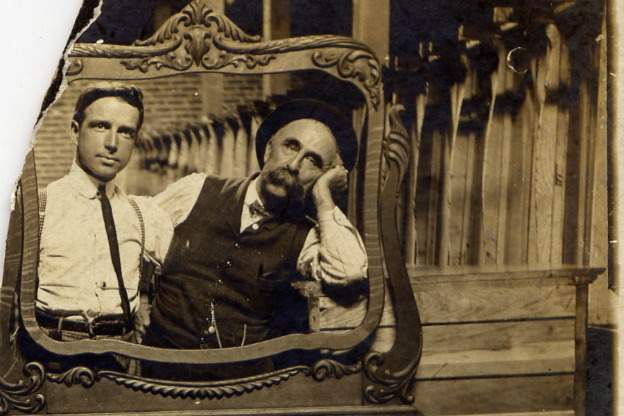
The fact that certain cities thrive and others don't is often represented as a matter of destiny.
"But in fact," asserts historian Eric Sandweiss, "the success of any city has always been made to seem inevitable by people who knew better."
The success of any city has always been made to seem inevitable by people who knew better.
Carmony Associate Professor of History at Indiana University, Sandweiss offered the introductory remarks at the City of Bloomington's second Rosemary Miller Lecture on Historic Preservation in February.
"The actual story of the rise of any great town or city," Sandweiss continued, "usually masks a lot more behind it: the hard work, the accidents, the treachery, the things that cause one site to prosper, often, at the expense of another."
Sandweiss was prompted to speculate about what gives certain cities that "je ne sais quoi" by the subject of the keynote speech that evening, and of the forthcoming IU Press publication: The Showers Brothers Furniture Company: The Shared Fortunes of a Family, a City, and a University.
Investigating Inevitability
Author Carrol Krause sought to delve beyond the myth of Bloomington, Indiana's inevitability by researching the one entity that may have been indispensable to it. To clarifyit's a defunct furniture company-and not the state seminary that became a major research university-that occupies the central role in this narrative of ascendancy.
As Sandweiss might have predicted, many of the narrative's specifics proved elusive.
"The books containing the complete financial history of the Showers Company from the beginning to the end have been lost," Krause lamented. "We would have known how many employees they had, the board of directors' minutes, how much the workers were paid."
Lacking this primary document, Krause pored over sixty years' worth of newspaper clippings on microfilm, "in negative, in low contrast," at the Indiana Room of the Monroe County Public Library.
As Krause discovered, the unlikeliness that a researcher would be able to retrace the story of the Showers Brothers Furniture Company was matched by the unlikeliness that the company would be established in Bloomington, let alone thrive. That a city existed in this spot at all was arbitrary enough.
"It's in the center of the county," Krause said, with a shrug. "There's no other reason to put it here."
No There There
The founding of the state university in Bloomington was equally puzzling. Vincennes University Indiana's oldestwas still contesting Bloomington's status and right to state funds. For its part, IU in the mid-nineteenth century certainly didn't resemble a state university. With a student body of about a hundred young men, and a handful of professors offering instruction in Greek and Latin, the institution was more like a cloister than the humanist oasis one might expect of a nascent college town.
Bloomington didn't just feel like it was off the beaten track at mid-century; it literally was. The railroad didn't come through Bloomington until 1853, guaranteeing that the city linger in a pre-industrial mode.
At the time this book opens, in 1856, there were barely 2000 people in Bloomington.
"This was an agrarian society," Krause explains. "At the time this book opens, in 1856, there were barely 2000 people in Bloomington." Most people lived in the county, where they could farm. Those who dared to eke out an existence in the ten-block-wide town encountered a serious lack of infrastructure and a persistence of rural habits. Everyday life in Bloomington in the 1850s was a drama of scarce water and free-range pigs.
Suffice it to say that the city's draw for prospective entrepreneurs was not obvious.
Enter C.C. Showers
So it's a bit of a mystery why itinerant Methodist preacher C.C. Showers brought his wife and seven children to Bloomington in the first place. There may have been a family connection. The unlikely patriarch of the Showers Brothers Furniture Company had a few skills in cabinet-making, and by 1860 or so, established a furniture store on the square, Showers and Hendrix.
Unfortunately, C.C. Showers' venture into furniture selling seems to have ended badly.
"Unfortunately," Krause remarked, "[C.C.'s] venture into furniture selling seems to have ended badly." After a number of law suits and a bankruptcy, the father left the shell of a business and plenty of debts for his sons to assume after his untimely demise.
The horrific accident ending C.C.'s life is just one of many gripping moments that transforms Krause's history into a thriller. The Showers endured more than their fair share of setbacks and suffering-from deaths in the family to factory fires-but also enjoyed unimaginable success.
Shared Fortunes
As the 20th century dawned, the Showers principals were driving luxury automobiles and constructing Victorian mansions. One of the large themes of Krause's book, however, is the extent to which the city enjoyed a corresponding transformation. From identifying a reliable water source, to founding a hospital, to building neighborhoods for their employees, and encouraging homeownership, the industrialists recognized that growing their business and creating a viable community were complementary pursuits.
The Showers Company was hit hard by the Depression, and waned over the course of the ensuing decades to close in 1955. In the 1960s, two fires "of mysterious origin" destroyed more than half of the original manufacturing complexonce hailed as "world's largest"-that sprawled from Morton to Rogers Street, and 8th to 11th Street, on Bloomington's near-west side.
But by then, the shuttering of the city's once-largest employer was inconsequential to the thriving burg, in which the university, and countless other corporate entities had come to the fore. After serving as university storage for several decades, the remaining Showers factory building-with its iconic sawtooth roofline-was reopened to house Bloomington City Hall in 1995.
Bloomington's persistence begs the question of the place's inevitability. Was some corporation simply bound to descend upon these coordinates, and create a city? "I think not," Krause responds, "but Bloomington is by far a better place because the Showers Company was here, and they cared about their community."






